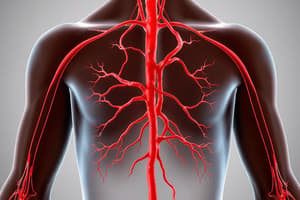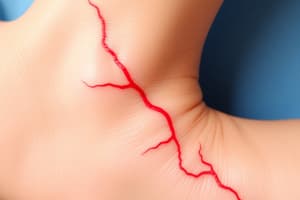Podcast
Questions and Answers
Which artery is responsible for supplying the pelvic cavity structures?
Which artery is responsible for supplying the pelvic cavity structures?
- Common iliac artery
- Internal iliac artery (correct)
- External iliac artery
- Femoral artery
What is the correct sequence of blood vessels from the abdominal aorta to the femoral artery?
What is the correct sequence of blood vessels from the abdominal aorta to the femoral artery?
- Abdominal aorta → Common iliac artery → External iliac artery → Femoral artery (correct)
- Abdominal aorta → Internal iliac artery → Femoral artery → Common iliac artery
- Abdominal aorta → External iliac artery → Common iliac artery → Femoral artery
- Abdominal aorta → Common iliac artery → Internal iliac artery → Femoral artery
Which of the following veins drains blood from the head and neck region?
Which of the following veins drains blood from the head and neck region?
- Subclavian vein
- External iliac vein
- Internal jugular vein (correct)
- Brachiocephalic vein
Which statement about systemic veins is true?
Which statement about systemic veins is true?
What is the role of the femoral artery within the circulatory system?
What is the role of the femoral artery within the circulatory system?
Which of the following accurately describes a feature of veins compared to arteries?
Which of the following accurately describes a feature of veins compared to arteries?
What is the primary function of the coronary arteries?
What is the primary function of the coronary arteries?
Which major vessels emerge from the arch of the aorta to supply the upper body?
Which major vessels emerge from the arch of the aorta to supply the upper body?
What correctly describes the function of skeletal muscles in relation to veins?
What correctly describes the function of skeletal muscles in relation to veins?
Which statement about the blood flow through the heart is accurate?
Which statement about the blood flow through the heart is accurate?
Flashcards are hidden until you start studying
Study Notes
Blood Supply and Arterial System
- The inferior mesenteric artery supplies the hindgut, covering from the distal half of the transverse colon to the rectum.
- The abdominal aorta bifurcates into left and right common iliac arteries, marking the end of the aorta's path.
- Common iliac arteries branch into internal iliac artery (supplying pelvic structures) and external iliac artery (which transitions into the femoral artery).
- The femoral artery supplies blood to the thigh and provides terminal branches to the leg and foot.
Venous System Overview
- Small veins drain into larger veins through tributaries, maintaining a hierarchical structure.
- Deep veins run alongside respective arteries, following their naming convention, while superficial veins are located near the skin's surface and do not accompany arteries.
Systemic Veins of Head and Neck
- Internal and external jugular veins are responsible for draining blood from the head and neck, leading to major venous structures.
Blood Vessel Functions
- Arteries transport blood away from the heart under high pressure and have thicker, elastic walls.
- Veins return blood to the heart at lower pressure, with thinner walls and often contain valves to aid blood flow against gravity.
Great Vessels and Aorta
- The arch of the aorta gives rise to three key arteries for the head, neck, and upper limb: Brachiocephalic, Left common carotid artery, and Left subclavian artery.
- The superior vena cava (SVC) drains blood from the upper body, while the inferior vena cava (IVC) processes blood returning from the lower body.
Coronary Circulation
- The heart receives blood via left and right coronary arteries originating from the base of the aorta, encircling the heart in the coronary sulcus.
- The coronary sinus collects venous blood from the heart muscles, facilitating its return to the right atrium.
Upper Limb Venous Drainage
- Blood from the upper limbs drains through the superficial cephalic veins and deep axillary veins.
- Axillary veins merge into subclavian veins; subclavian and internal jugular veins combine to form brachiocephalic veins, which lead into the superior vena cava.
Venous System of the Abdomen
- The inferior vena cava (IVC) collects blood from the left and right renal veins, along with common iliac veins that drain lower body regions.
- The femoral vein serves as the deep drainage vessel for blood from the lower limb.
Studying That Suits You
Use AI to generate personalized quizzes and flashcards to suit your learning preferences.




